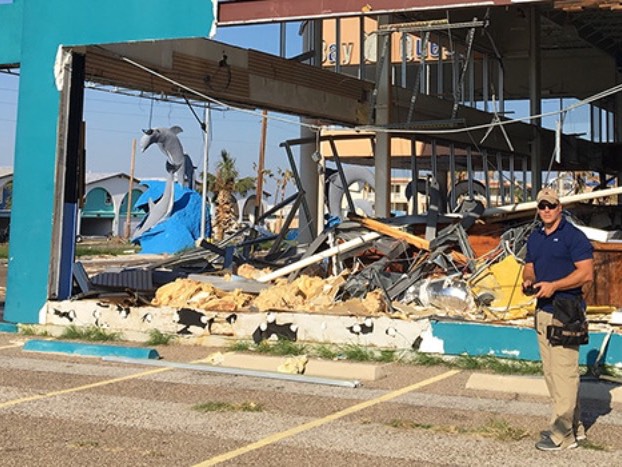 Courtesy
CourtesyShe tried to hold back tears as she approached her husband and the insurance adjuster taking stock of the few belongings they had left after Hurricane Harvey made landfall. Her efforts to contain her emotions failed as the insurance adjuster turned to face her. Her tears were not for the lost belongings, but for her husband with terminal brain cancer. If only the floodwaters could've washed away the medical bills.
For those sitting high and dry, the scene in Rockport, Texas, was unimaginable.
“I remember one day I looked down and I could've sworn I put on tan pants that morning,” said James Balman. “But my pants were almost completely black. I looked closer and my pant legs were just covered in mosquitos.”
The damage, he said, was unlike anything you could imagine.
“You see these boards that are just split in half, and they got that way because a regular sheet of printer paper gained enough velocity to slice it in two,” he said.
Balman is an insurance adjuster and a Wichita State Master of Innovation Design (MID) student contributing to Hurricane Harvey relief efforts. He is an independent adjuster, contracted by a variety of insurance agencies to help assess damages and accurately process insurance claims. The software he had been working on during his time at WSU is now making a difference to the citizens of Rockport, Texas.
“You become very intimate with them, the people whose belongings you are assessing,” said Balman. “You learn that there is no savings for stuff like this, and a lot of people don't have the means to go anywhere.”
The software Balman is working on makes it possible for insurance companies to assess structural damage to buildings with the help of drones, a much safer option than sending a person. The technology helps to determine shingle type, dimensions and overall damages. The images the drones capture accelerate the process of assigning funds based on insurance claims.
In the wake of a natural disaster, people like Balman have more work than one person should reasonably be able to handle. He often works close to 24 hours at a time.
Even though Balman is running short on sleep and time off, he is committed to doing the work right.
“It's pretty rewarding to get down here and do it right,” said Balman. “If you don't do it right, it affects a lot of people.”
Even though Balman isn't at WSU this semester, his work in Texas is earning him a credit toward his degree, as well as valuable applied learning experience, says Jeremy Patterson, director of the MID program.
“The MID program is about teamwork, leadership and decision making to overcome challenges, and this experience will certainly impact how he moves products or services forward in the future,” Patterson says. “We're looking forward to his return and being able to share and reflect on the past couple months and continuing the impact by collaborating with classmates.”

